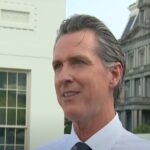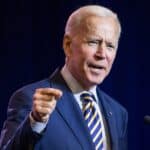








The Trump administration just slammed the brakes on visitor visas for Palestinian Authority passport holders, effective August 31, 2025.
Breitbart reported that starting with a cable on August 18, 2025, the State Department ordered consular posts worldwide to halt approvals for nearly all non-immigrant visas for Palestinians, citing Section 221(g) of the Immigration and Nationality Act.
This move blocks travel for medical care, education, family visits, and business. Those with dual citizenship or existing valid visas dodge the restriction. The policy builds on earlier measures, like the August 16, 2025, pause on visas for Gazans seeking medical treatment.
It’s a clear signal of U.S. support for Israel amid the nearly two-year Gaza war, sparked by Hamas’s October 7, 2023, attack that killed over 1,200 Israelis and took more than 250 hostages. Over 9,000 Palestinians entered the U.S. on visitor visas in 2024, per the Migration Policy Institute.
Secretary of State Marco Rubio also announced visa denials or revocations for senior Palestinian leaders, including President Mahmoud Abbas, barring them from the UN General Assembly. Rubio claims this holds the Palestinian Authority accountable for chasing unilateral statehood recognition, which he says undermines peace.
Progressives might cheer such recognition, but it’s a diplomatic middle finger to Israel’s call for direct talks. The State Department defends the visa suspension as a “concrete step” for national security and legal compliance.
Critics like Hala Rharrit, a former State Department spokeswoman, call it an “open-ended refusal” that smells more like politics than principle. The left’s outrage ignores how the Palestinian leadership’s UN gambits sidestep the hard work of negotiated peace.
Palestinian Authority passports, issued since the 1990s under Israel-PLO interim agreements, are now effectively blacklisted for U.S. entry.
This isn’t just bureaucracy—it’s a gut punch to Palestinians seeking medical care or education abroad. Still, rewarding unilateral statehood bids risks emboldening groups like Hamas, who thrive on chaos.
Palestinian communities in cities like Chicago, Paterson, and Anaheim feel the sting of this policy. Families hoping to reunite or students aiming for U.S. universities now face a bureaucratic wall. The progressive narrative paints this as pure cruelty, but it’s also a calculated move to pressure Palestinian leaders into direct negotiations.
The visa clampdown aligns with U.S. sanctions on the Palestinian Authority announced in July 2025. Israel argues that recognizing Palestinian statehood without talks rewards terrorism—a view the U.S. clearly shares. France, Canada, and the UK’s September 2025 plans to recognize a Palestinian state only deepen the diplomatic rift.
Lafi Adeeb, mayor of Turmus Ayya, laments that Palestinians are “always treated unjustly.” His frustration is real, but it glosses over the Palestinian Authority’s refusal to engage Israel directly. The woke crowd might cry victimhood, but diplomacy isn’t a one-way street.
Mahmoud Abbas’s office called the UN visa bans “astonishing,” as if international forums should be free-for-alls. The reality? Nations like the U.S. prioritize alliances—here, with Israel—over appeasing leaders who bypass peace talks. Expect the UN General Assembly to be a quieter affair for Palestinian officials this year.
Kerry Doyle, a former Immigration and Customs Enforcement lawyer, questions whether this is about national security or political posturing.
Transparency isn’t the Trump administration’s strong suit, but the policy’s timing—amid Gaza tensions—suggests more than election-year optics. Still, Doyle’s call for clarity resonates with those wary of government overreach.
The visa suspension doesn’t affect Palestinians with dual citizenship, a small but notable carve-out. This exemption shows the policy isn’t a blanket ban but a targeted jab at the Palestinian Authority’s leadership and strategy. Critics who scream “discrimination” might pause if they considered the security context.
The U.S. has backed Israel unwaveringly since the Gaza war began, and this visa policy doubles down on that stance.
By choking off Palestinian travel, the administration signals zero tolerance for moves that sidestep Israel’s security concerns. The left’s push for Palestinian statehood without negotiations looks increasingly like a pipe dream.
Palestinian leaders face a choice: engage Israel directly or keep hitting walls like this visa ban. The Trump administration’s approach may feel harsh, but it’s rooted in a belief that peace comes through tough, face-to-face talks, not UN resolutions. Woke idealism won’t change that calculus.



